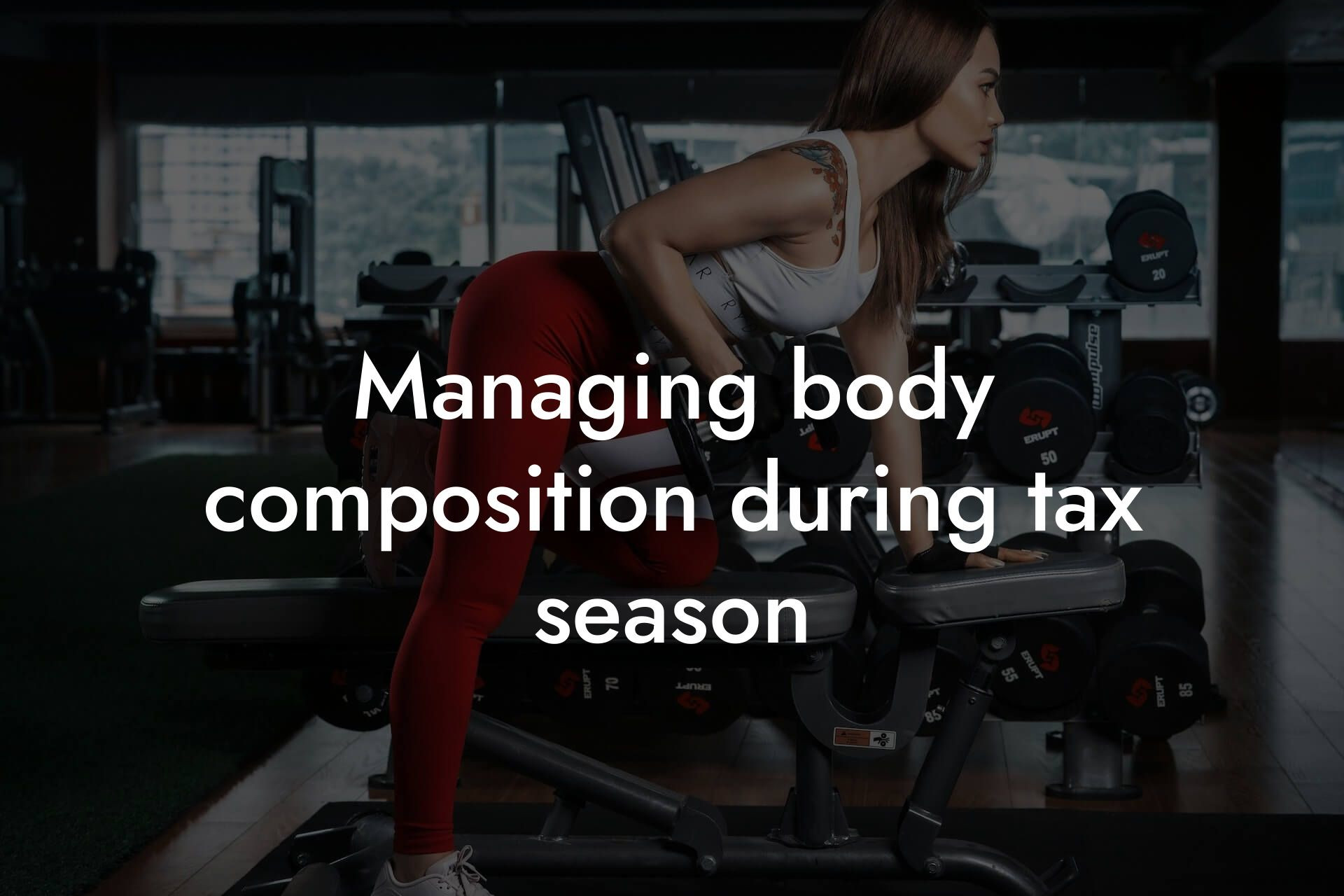As a high-earning professional in the finance industry, you're no stranger to long hours, high stress, and a fast-paced work environment. While your career may be thriving, your physical health may be suffering as a result. It's common for finance professionals to neglect their fitness and well-being due to the demands of their job, but neglecting your health can have serious consequences on your overall performance and quality of life.
Table of Contents
- Why Fitness Matters in Finance
- Common Challenges Faced by Finance Professionals
- Creating a Fitness Routine That Works for You
- Nutrition and Meal Planning for Busy Finance Professionals
- Staying Active During Long Hours at the Office
- Using Technology to Your Advantage
- Getting Support and Accountability
- Frequently Asked Questions
Why Fitness Matters in Finance
Staying fit is crucial for finance professionals, as it can have a direct impact on their productivity, focus, and overall job performance. When you're physically fit, you're more energized, motivated, and better equipped to handle the mental and emotional demands of your job. Additionally, regular exercise can help reduce stress, improve sleep quality, and boost your mood, all of which are essential for success in the finance industry.
Common Challenges Faced by Finance Professionals
There are several challenges that finance professionals face when it comes to staying fit, including:
Long hours: Finance professionals often work long hours, leaving little time for exercise or self-care.
Sedentary work environment: Desk jobs can lead to a sedentary lifestyle, making it difficult to stay active and engaged in physical activity.
High stress: The finance industry is known for its high-stress environment, which can lead to poor eating habits, lack of sleep, and neglect of physical health.
Travel and irregular schedules: Finance professionals often travel for work or have irregular schedules, making it difficult to establish a consistent fitness routine.
Creating a Fitness Routine That Works for You
Despite the challenges, it's possible to create a fitness routine that works for you and your busy schedule. Here are some tips to get you started:
Start small: Begin with short, manageable workouts, such as 20-30 minute sessions, 2-3 times a week.
Find activities you enjoy: Engage in physical activities that bring you joy, whether it's running, swimming, cycling, or group fitness classes.
Schedule it in: Treat your workouts as non-negotiable appointments and schedule them in your calendar.
Make it convenient: Find ways to incorporate physical activity into your daily routine, such as taking the stairs instead of the elevator or doing a quick workout during your lunch break.
Nutrition and Meal Planning for Busy Finance Professionals
A healthy diet is essential for optimal fitness and performance. However, with long hours and busy schedules, it can be challenging to plan and prepare healthy meals. Here are some tips to help you fuel your body:
Meal prep: Set aside time on the weekends or one day a week to prepare healthy meals for the next few days.
Pack snacks: Keep healthy snacks on hand, such as nuts, fruits, and energy bars, to curb cravings and prevent unhealthy impulse snacking.
Stay hydrated: Drink plenty of water throughout the day to stay energized and focused.
Avoid convenience foods: Try to limit your intake of convenience foods, such as fast food and processed snacks, which can be high in sugar, salt, and unhealthy fats.
Staying Active During Long Hours at the Office
Just because you're stuck at your desk doesn't mean you can't stay active. Here are some ways to incorporate physical activity into your workday:
Take breaks: Take short breaks every hour to stretch, move around, and get your blood flowing.
Use a standing desk: Consider using a standing desk or adjustable desk to alternate between sitting and standing throughout the day.
Walk while you work: Use a walking desk or treadmill desk to stay active while you work.
Desk exercises: Do simple exercises at your desk, such as shoulder rolls, wrist extensions, and toe taps, to stay active and engaged.
Using Technology to Your Advantage
There are many fitness apps, tools, and devices that can help you stay on track with your fitness goals, even with a busy schedule. Here are a few options:
Fitness trackers: Wearable devices, such as Fitbits or Apple Watches, can track your activity levels, sleep quality, and nutrition.
Fitness apps: Apps, such as Nike Training Club or JEFIT, offer workout routines, tracking features, and community support to help you stay motivated.
Virtual fitness classes: Take advantage of virtual fitness classes or online workout platforms, such as Peloton or Aaptiv, to stay active and engaged from the comfort of your own home.
Getting Support and Accountability
Having a support system in place can make all the difference in your fitness journey. Here are some ways to get support and accountability:
Find a workout buddy: Find a colleague or friend who shares your fitness goals and schedule workouts together.
Hire a personal trainer: Work with a personal trainer who can create a customized fitness plan and provide accountability and motivation.
Join a fitness community: Join online fitness communities or forums to connect with others who share your fitness goals and challenges.
Staying fit during long hours in finance requires commitment, creativity, and a willingness to prioritize your physical health. By creating a fitness routine that works for you, fueling your body with healthy nutrition, and staying active during long hours at the office, you can improve your overall performance, productivity, and quality of life. Remember to use technology to your advantage, get support and accountability, and make your health and fitness a non-negotiable part of your busy schedule.
At Tano Performance Group, we understand the challenges of staying fit as a high-earning professional. That's why we offer comprehensive body assessments using our state-of-the-art DEXA machine. Our team of experts will provide you with a complete picture of your body composition, including body fat percentage, bone density, and muscle mass, to help you take your fitness and performance to the next level. Contact us today to learn more about our services and how we can help you achieve your fitness goals.
Frequently Asked Questions
What are the common health risks associated with long hours in finance?
Long hours in finance can lead to a range of health risks, including obesity, diabetes, cardiovascular disease, and musculoskeletal disorders. Prolonged sitting, lack of physical activity, and poor eating habits can contribute to these health issues. Additionally, chronic stress, fatigue, and sleep deprivation can further exacerbate these risks.
How can I prioritize my physical health when working long hours in finance?
Prioritizing your physical health requires intentional effort and commitment. Start by scheduling time for exercise, even if it's just 30 minutes a day. Make healthy food choices, and avoid relying on convenience foods or sugary snacks. Also, take regular breaks to stretch, move around, and rest your eyes.
What are some quick and effective exercises I can do at my desk?
There are several exercises you can do at your desk to stay active and energized. Try chair squats, desk push-ups, leg raises, and arm circles. You can also do some simple stretches, like neck rolls, shoulder rolls, and wrist extensions. These exercises can help reduce the risk of musculoskeletal disorders and improve your overall well-being.
How can I stay hydrated during long hours at the office?
Staying hydrated is crucial for maintaining focus and energy. Drink plenty of water throughout the day, aiming for at least 8-10 glasses. Avoid sugary drinks and caffeine, which can dehydrate you further. You can also infuse your water with fruits or herbs for added flavor and nutrition.
What are some healthy snack options for busy finance professionals?
Healthy snacking is essential for maintaining energy levels and curbing cravings. Opt for nuts, seeds, fruits, and veggies with hummus. You can also prepare your own snacks, such as energy balls, trail mix, or cut veggies with guacamole. Avoid processed snacks and sugary treats that can lead to energy crashes and weight gain.
How can I manage stress and anxiety during peak financial seasons?
Managing stress and anxiety requires a holistic approach. Practice deep breathing exercises, meditation, or yoga to calm your mind and body. Take regular breaks, go for a walk, or do some stretching exercises to release tension. Prioritize sleep, aim for 7-8 hours, and establish a relaxing bedtime routine to improve sleep quality.
What are some tips for getting enough sleep when working long hours in finance?
Getting enough sleep is critical for physical and mental recovery. Establish a consistent sleep schedule, aiming for 7-8 hours of sleep each night. Create a relaxing bedtime routine, avoid screens and electronic devices before bed, and make your sleep environment comfortable and dark. Avoid caffeine and heavy meals close to bedtime, and try to wind down with a book or calming activity.
How can I balance my work and personal life as a finance professional?
Balancing work and personal life requires setting clear boundaries and priorities. Set realistic goals, learn to say no to non-essential tasks, and delegate when possible. Schedule time for personal activities, such as exercise, hobbies, or spending time with loved ones. Make time for self-care and prioritize activities that bring you joy and fulfillment.
What are some common myths about exercise and fitness in the finance industry?
One common myth is that you need to spend hours at the gym to see results. However, even short bursts of exercise, such as 10-15 minutes, can be beneficial. Another myth is that exercise has to be intense or high-impact to be effective. Low-impact exercises, like yoga or walking, can be just as beneficial for overall health and fitness.
How can I stay motivated to exercise and prioritize my physical health?
Staying motivated requires setting realistic goals, finding an exercise routine you enjoy, and tracking your progress. Celebrate small victories, like increasing your water intake or taking a 10-minute walk during lunch. Find an accountability partner or join a fitness community to stay motivated and inspired.
What are some common barriers to exercise and fitness in the finance industry?
Common barriers to exercise and fitness in the finance industry include lack of time, energy, and motivation. Additionally, long hours, travel, and work-related stress can make it challenging to prioritize physical health. However, by incorporating small changes into your daily routine, such as taking the stairs or doing desk exercises, you can overcome these barriers and make progress towards your fitness goals.
How can I incorporate strength training into my busy schedule?
Incorporating strength training can be as simple as doing bodyweight exercises, like push-ups, squats, and lunges, during commercial breaks or lunch. You can also use resistance bands or light weights at your desk. Aim for 2-3 strength training sessions per week, focusing on different muscle groups each time.
What are some benefits of high-intensity interval training (HIIT) for finance professionals?
HIIT offers several benefits for finance professionals, including improved cardiovascular health, increased energy, and enhanced mental clarity. HIIT workouts are typically short, 20-30 minutes, making them ideal for busy schedules. Additionally, HIIT can help reduce stress and anxiety, improve sleep quality, and boost overall physical fitness.
How can I make healthy food choices when eating out or ordering takeout?
Making healthy food choices when eating out or ordering takeout requires planning and intention. Opt for grilled or baked options, avoid fried foods, and choose vegetables or salads as sides. Consider meal prep or packing your own snacks to avoid relying on convenience foods.
What are some tips for staying active during the winter months?
Staying active during the winter months requires creativity and motivation. Find indoor activities you enjoy, such as yoga, Pilates, or swimming. Invest in a fitness tracker or workout app to stay accountable. Schedule outdoor activities, like walking or skiing, on weekends or days off. Prioritize self-care and make time for relaxation and rest.
How can I track my progress and stay accountable to my fitness goals?
Tracking your progress and staying accountable requires setting clear goals, tracking your progress, and celebrating small victories. Use a fitness tracker, journal, or app to monitor your progress. Share your goals with a friend or accountability partner to stay motivated. Celebrate small victories, like increasing your water intake or taking a 10-minute walk during lunch.
What are some common mistakes finance professionals make when trying to get fit?
Common mistakes finance professionals make when trying to get fit include setting unrealistic goals, neglecting proper nutrition, and overdoing it. It's essential to set realistic goals, prioritize nutrition, and listen to your body to avoid burnout and injury.
How can I make fitness a habit and incorporate it into my daily routine?
Making fitness a habit requires consistency, patience, and persistence. Start small, incorporating short workouts or activities into your daily routine. Schedule fitness activities, like exercise or stretching, into your calendar. Find an accountability partner or join a fitness community to stay motivated and inspired.
What are some benefits of yoga and meditation for finance professionals?
Yoga and meditation offer several benefits for finance professionals, including reduced stress and anxiety, improved focus and concentration, and enhanced overall well-being. These practices can also improve sleep quality, boost energy, and increase productivity.
How can I prioritize my physical health during peak financial seasons?
Prioritizing your physical health during peak financial seasons requires intention and commitment. Schedule time for exercise, even if it's just 10-15 minutes. Make healthy food choices, stay hydrated, and prioritize sleep. Take regular breaks, stretch, and move around to reduce the risk of musculoskeletal disorders.
What are some tips for staying fit while working from home?
Staying fit while working from home requires discipline and creativity. Schedule time for exercise, even if it's just a 10-minute walk. Create a dedicated workspace to avoid the temptation to work from bed or the couch. Take regular breaks, stretch, and move around to reduce the risk of musculoskeletal disorders.
Here are some related articles you might love...
- How to maintain a healthy lifestyle during high-stress financial periods
- Managing body composition during tax season
- Nutrition strategies for staying energized during market hours
- How to balance client dinners with fitness goals
- The benefits of regular DEXA scans for finance professionals
- Best practices for staying fit in a sedentary job
- The impact of body fat on cognitive function in finance
- The role of physical fitness in stress management for finance professionals
- Quick workout routines for bankers on the go
Zak Faulkner
Zak Faulkner is a leading authority in the realm of physical health and body composition analysis, with over 15 years of experience helping professionals optimise their fitness and well-being. As one the experts behind Tano Performance Group, Zak has dedicated his career to providing in-depth, science-backed insights that empower clients to elevate their physical performance and overall health.
With extensive knowledge of DEXA technology, Zak specializes in delivering comprehensive body assessments that offer precise data on body fat, muscle mass, bone density, and overall physique. His expertise enables individuals to make informed decisions and achieve their fitness goals with accuracy and confidence. Zak’s approach is rooted in a deep understanding of human physiology, combined with a passion for helping clients unlock their full potential through personalised strategies.
Over the years, Zak has earned a reputation for his commitment to excellence, precision, and client-focused service. His guidance is trusted by top professionals who demand the best when it comes to their health. Whether advising on fitness programs, nutritional strategies, or long-term wellness plans, Zak Faulkner’s insights are a valuable resource for anyone serious about taking their health and fitness to the next level.
At Tano Performance Group, Zak continues to lead our Content Team revolutionising how professionals approach their physical health, offering unparalleled expertise that drives real results.




